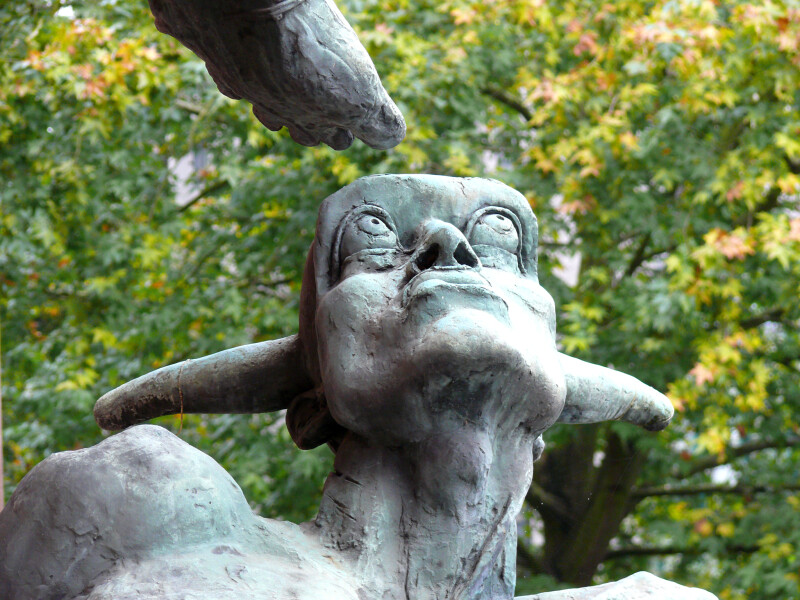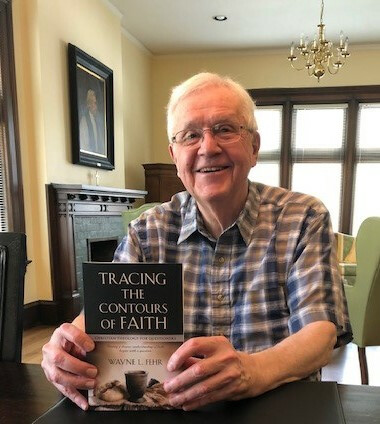EPISCOPAL DIOCESES ANNOUNCE COOPERATIVE MINISTRY
The Episcopal Dioceses of Fond du Lac and Milwaukee are pleased to announce a new cooperative ministry to provide a joint summer camp and youth ministry resource person for diocesan congregations. Each diocese has a strong heritage of ministry with youth, including camping, having pursued a variety of models, approaches and methods over the past decades.
“For many years, there has been conversation about coming together for camp,” Bishop Matt Gunter of Fond du Lac notes. “The positive comments about this idea has grown, especially these past two years. I’ve heard from youth and adults, clergy and laity, campers and staff, asking why we aren’t doing camp together” Bishop Jeff Lee of Milwaukee also heard similar comments. Fond du Lac summer camp sessions in 2021 and 2022 included campers and staff from the Dioceses of Eau Claire and Milwaukee.
Middler campers and staff gather for a picture in front of the ‘Chi Rho’ at Waypost Camp on the shores of Mission Lake.
“In addition to camp, several diocesan leaders recognized a need for a youth ministry resource person to be available for congregations to reach out to for support, guidance and direction,” noted Matthew Payne, Lay Canon for Administration for Fond du Lac. “After we had conversation with diocesan leaders, it became clear that one proposal which encompassed both areas was feasible in terms of time and financial resources.”
That proposal was to create a position of Youth Networking Coordinator (YNC). This full-time position would have two key components – summer camp director and coordinator for networking youth ministries. This integrated approach would see camp as a foundation for a year-round networking resource person to build connections and relationships to expand networking with congregations. Each diocese had youth staff funding in their 2023 budgets whose combination allows implementing the full proposal. A Steering Committee, with members from each diocese selected for camp or youth work experience, will provide oversight to the ministry venture.
Bishop Jeff Lee (left) and Bishop Matt Gunter (right) model the camp t-shirt from summer 2022.
Camp sessions will be held over three weeks in June 2023 at Waypost Camp, east of Wausau, Wisconsin. Having been the site of the Fond du Lac camp for the past two years, its facilities have proved amazingly suited to the program. Waypost is owned and operated by the Evangelical Lutheran Church in America. Working with a Christian camp allows for collaboration unavailable from secular facilities. Because The Episcopal Church is in full communion with the ELCA, there is also an ecumenical benefit. Recognizing the driving distances involved for some, consideration will be made to coordinate carpooling or transportation service from the Milwaukee area.
Youth networking will involve building relationships with diocesan and congregational leaders and offering support and assistance to those engaged in youth ministry. The coordinator will be aware of and informed of ministry resources, programs, and church-wide networks in youth ministry. The coordinator will also directly engage each year with at least 1/3 of congregations in each diocese over a three-year cycle. This may be an in-person visit but may be through in-depth Zoom or other connections.
 Bishop Gunter and Bishop Lee readily recognized a person who was qualified, skilled, and experienced in both camp management and youth ministry and already employed by Fond du Lac and have hired Erin Wolf as Youth Networking Coordinator starting January 1, 2023. Wolf has been diocesan youth ministry coordinator and camp director since 2016 and director of youth ministry at All Saints, Appleton since 2012. She has served congregations in Episcopal and ELCA congregations for nearly two decades. Because relational work is an important part of the YNC, Bishop Lee and Bishop Gunter noted she has been actively involved in youth ministry and camp in both dioceses, both as a youth and adult. Wolf holds a Bachelor of Arts in Religious Studies from Cardinal Stritch University and has been involved in youth ministry networks in the Episcopal Church on the provincial and national level. She is also a musician and songwriter.
Bishop Gunter and Bishop Lee readily recognized a person who was qualified, skilled, and experienced in both camp management and youth ministry and already employed by Fond du Lac and have hired Erin Wolf as Youth Networking Coordinator starting January 1, 2023. Wolf has been diocesan youth ministry coordinator and camp director since 2016 and director of youth ministry at All Saints, Appleton since 2012. She has served congregations in Episcopal and ELCA congregations for nearly two decades. Because relational work is an important part of the YNC, Bishop Lee and Bishop Gunter noted she has been actively involved in youth ministry and camp in both dioceses, both as a youth and adult. Wolf holds a Bachelor of Arts in Religious Studies from Cardinal Stritch University and has been involved in youth ministry networks in the Episcopal Church on the provincial and national level. She is also a musician and songwriter.
“As another sign of our deepening cooperation with Episcopalians across the State of Wisconsin, I am delighted we will share in supporting Erin Wolf’s expanded role as Youth Networking Coordinator,” Bishop Jeff Lee of Milwaukee shared. “She brings a wealth of experience to this work, and I am confident that youth and adults will benefit from her leadership. Welcome, Erin!”
Look for additional information about camp and networking opportunities in January 2023.


